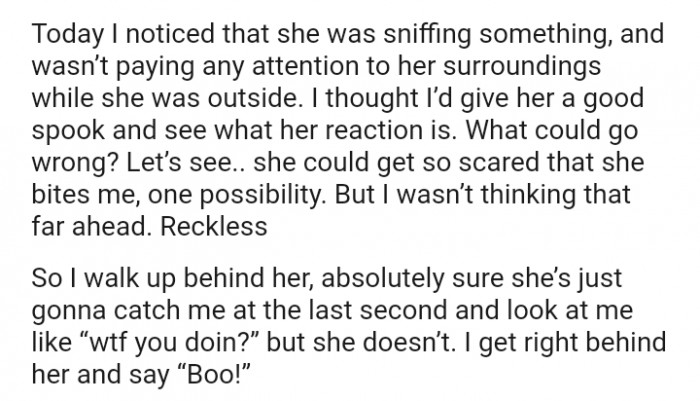Redditor Regrets Trying To Scare Dog As He Got Rewarded With A Brownish Grey Anal Fluid All Over Him
Dogs are frequently associated with being the protectors of our families. If someone is not supposed to be at your home, your dog will bark to keep them away.
A dog will stand between a relative and an outsider. Dogs are often viewed as tough animals that provide their owners with security and safety.
However, many of us have dogs that react differently to loud noises or even to strangers. Some dogs may flee or whimper if they notice something new on their owners, such as a cap, a pair of gloves, or spectacles.
You might wonder if dogs experience the same feelings of terror as people do when they jump at loud noises or avoid situations that make them feel fearful. If you have ever been around a small dog whose bark is louder than its bite, you have encountered a fearful dog.
So, you can imagine what happens when a pawrent decides to scare their doggo. Just like the OP in today’s TIFU story, it won’t end well for that pawrent.
The OP has a six-month-old pit bull who is well taken care of. The OP decided that it would be a good day to spook her since she was sniffing something and wasn’t paying any attention to her surroundings.
The OP considered all the possibilities of what could happen, but little did he know that something huge and gross awaited.
The day I messed up story

I wasn't thinking that far ahead

She soon realized it was a spook

Understanding Fear Responses in Pets
The incident described highlights how fear responses in animals can mirror those in humans, reflecting an innate survival mechanism. According to Dr. Karen Becker, a veterinarian and animal behaviorist, dogs can exhibit defensive behaviors when they feel threatened or scared.
Research shows that certain stimuli, such as sudden movements or loud noises, can trigger these responses, leading to behaviors that may seem irrational to their owners. A study published in the Journal of Veterinary Behavior emphasizes the importance of understanding animal psychology to prevent these situations.
Understanding Fear Responses in Dogs
Behavioral research indicates that dogs can exhibit fear responses akin to those in humans when they feel threatened, leading to surprising physical reactions.
Dr. John Paul Scott, a noted animal behaviorist, emphasizes that these reactions are often instinctual and can be exacerbated by previous traumatic experiences.
This highlights the importance of understanding canine behavior and the impact of human actions on their emotional states.
Dogs can basically skunk you if you scare them

Below are some of the comments from redditors...
1. It's literally this

2. An education on lasers

Moreover, this scenario underscores the significance of empathy and understanding in human-animal interactions. Psychologists emphasize that developing a deeper awareness of a pet's emotional state can greatly reduce instances of fear-induced reactions. As Dr. Rick Hanson, neuropsychologist, states, "When we recognize and respond to our pets' stress signs, we cultivate a more secure and trusting relationship." Such awareness can mitigate the risk of negative incidents, ensuring a more harmonious environment for both pets and their owners.
Studies show that many dog owners underestimate the effects of their behavior on their pets' emotional well-being, often leading to unintended consequences.
According to research published in the Journal of Applied Animal Welfare Science, fear-based reactions in dogs can lead to behavioral issues, including aggression or anxiety.
Understanding these dynamics is vital for fostering a safe environment for pets and their owners.
3. Another person is also giving the laser warning

4. This redditor has the same story with his pup

5. I see what you did there

Promoting Positive Interactions with Pets
To prevent similar situations in the future, pet owners should focus on positive reinforcement training methods. A plethora of studies suggest that rewarding desired behaviors rather than punishing undesired ones leads to better outcomes in pet behavior. Dr. Ian Dunbar, a renowned animal behaviorist, has advocated for this approach, emphasizing that positive reinforcement builds trust and reinforces healthy behaviors.
Implementing training programs that prioritize gradual exposure to stressors can also help pets become more resilient. Programs designed by certified trainers can provide invaluable guidance on creating safe and supportive environments for pets.
Practical Approaches to Dog Training and Care
For dog owners, implementing positive reinforcement techniques can significantly reduce fear responses in pets.
Professional trainers recommend using treats and praise to reinforce desired behaviors, creating a positive association with previously fear-inducing stimuli.
Additionally, providing a safe space for dogs to retreat during stressful situations can help mitigate their fear responses.
6. You are going to be insanely popular

7. It is totally nuts to spook a pet

8. Well, now you know

Furthermore, understanding the concept of desensitization can be crucial for fearful pets. Research shows that gradual exposure to feared stimuli, paired with positive experiences, can help mitigate fear responses over time. This therapeutic approach is akin to techniques used in human exposure therapy, where gradual exposure to a fear can lead to desensitization and reduced anxiety.
By employing these strategies, pet owners can not only enhance their pets' well-being but also foster a more peaceful coexistence.
Engaging in training sessions with a qualified dog trainer or behaviorist can also enhance understanding of canine behavior.
Learning about dog body language and signals can improve the owner-pet relationship, reducing misunderstandings and fostering trust.
Ultimately, patience and consistent training are key elements in helping dogs feel secure and confident in their environments.
9. It is really. You can ask the OP... Again

10. This redditor is of the opinion that the OP deserved what he got

11. It certainly worried and disgusted this Redditor

12. He might be your best pal for years but...

13. One of the only people in the world to do that

14. I give dogs more credit than they deserve

15. He has expressed his glands in his sleep

16. Man's best friend is indeed the smartest

17. A whole lesson on why you should never use a laser pointer on your dog

18. Young dogs can be traumatized by a scare

19. The dog must have been really concentrated

20. This redditor can't even begin to imagine the OP's shock

Your dog could be scared by new situations, unfamiliar people, unfamiliar surroundings, storms, loud noises, and many more things. It's possible that dogs don't experience terror the same way humans do.
They may not experience an adrenaline surge like humans do, but it's more than likely that they do. They'll undoubtedly become frightened and, just like they did in the OP's case, they’ll literally skunk you.
Psychological Analysis
This incident underscores the need for a greater understanding of canine behavior and the potential consequences of triggering fear responses.
It's crucial for owners to recognize how their actions can impact their pets' emotional well-being and to approach training with compassion and awareness.
Analysis generated by AI
Analysis & Alternative Approaches
Understanding the fear responses of dogs is essential for fostering a healthy relationship between pets and their owners.
Research consistently emphasizes the importance of positive reinforcement and creating a safe environment for dogs to thrive.
By addressing these needs, owners can cultivate a more harmonious living situation that benefits both parties.
Analysis & Alternative Approaches
This incident serves as a poignant reminder of the importance of understanding animal behavior and the psychology behind fear responses. Mental health professionals advocate for a compassionate approach that prioritizes positive reinforcement and empathy in pet interactions.
Through education and proactive training, pet owners can cultivate a more secure environment for their animals, ultimately leading to healthier relationships.



